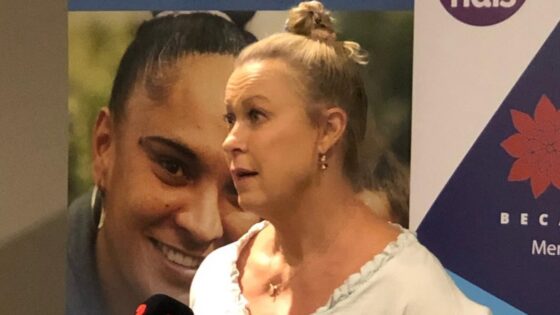Few names in Australian sport are spoken with as much respect and warmth as Lisa Curry. A three-time Olympian and winner of 30 international medals, she’s long been celebrated for her fierce determination in the pool. But in recent years, Curry’s strength has taken on a different form. One shaped not by sporting glory, but by a mother’s enduring grief. In 2020, Lisa faced the most devastating moment of her life: the death of her 33-year-old daughter, Jaimi, after a long and painful battle with anorexia nervosa.
The loss tore through her world, leaving a wound that no medal or title could ever heal. Yet in her sorrow, Curry found a purpose to speak out, to support, and to save others from the agony she’s endured. Now, the beloved swimming icon is lending her voice to the Eating Disorders Genetics Initiative 2 (EDGI2), calling on 4,000 Australians who’ve experienced eating disorders to participate in the world’s largest genetic study into these complex illnesses.
Lisa Curry is turning heartbreak into hope, urging Australians to take part in a groundbreaking genetic research initiative that could revolutionize how eating disorders are understood and treated. “Too little is known about eating disorders, which affect over a million Australians,” Curry shared passionately. “Eating disorders remain among the most stigmatised mental health conditions. This stigma often prevents people from seeking help, making things worse.” Her voice, both as a grieving mother and a national icon, brings urgency to an issue long hidden in silence. She believes it’s time to lift the veil, for Jaimi and for the countless others still struggling.
In partnership with scientists, clinicians, and advocates across the country, Curry’s appeal comes alongside fresh findings published in the Medical Journal of Australia’s Insight+ report. The research highlights how eating disorders stem from a complex blend of genetic, psychological, and environmental influences, making treatment notoriously difficult. In 2023 alone, 1.1 million Australians and nearly one in 23 adults were living with an eating disorder. Even more alarming is the upward trend of a 21% increase in cases over just 11 years. From puberty and pregnancy to perfectionist tendencies and toxic body ideals, the risk factors are as varied as they are misunderstood.
The human toll is heartbreaking and deeply personal for many, like 35-year-old Lauren from Adelaide. A peer support worker and mother of three, she’s battled anorexia nervosa for 14 years. It wasn’t until she turned 26 that she finally sought help and began her road to recovery. A journey Lisa Curry hopes will become easier, earlier, and more accessible for others through this study.
Genes, grief, and a mother’s mission: Lisa Curry’s brave fight for awareness
The next phase of the Eating Disorders Genetics Initiative (EDGI2) builds on significant scientific breakthroughs. Made in earlier studies, including the Anorexia Nervosa Genetics Initiative (ANGI), these projects identified eight genes linked to anorexia nervosa, highlighting that the disorder has both psychiatric and metabolic origins. “This discovery was completely unexpected, and requires urgent replication and further study to fully understand the pathways leading to anorexia nervosa,” explained lead Australian EDGI2 investigator Professor Nick Martin. He emphasized the urgent need for a larger and more diverse sample size to improve predictions. Identify risk factors, and eventually create personalized treatments.
Professor Sarah Maguire OAM, chief investigator for EDGI2 Australia, reinforced that eating disorders don’t discriminate. They can affect anyone, regardless of their appearance, age, or background. “They impact the individual, and their family in just about every way possible – professionally, personally, emotionally and psychologically,” she said, stressing the profound toll these illnesses take. Jane Rowan, Executive Director of Eating Disorders Families Australia and a career with lived experience, underscored the urgency of early intervention. For Lisa Curry, this advocacy is deeply personal. Since the devastating loss of her daughter Jaimi, she has openly documented her own painful road through grief.
In early 2023, she shared that it had taken her three and a half years to feel ready to return to the gym. Her journey has included physical setbacks like a hip replacement. Basically, she suffered a fall in Canada and health scares. This included a terrifying incident in Fiji where a sugary cocktail triggered her defibrillator. It caused her heart rate to spike to 270 bpm. That moment led her to quit alcohol and become even more vocal about monitoring heart health. Now, as she continues to grieve and heal, Lisa is channeling her pain into purpose. Not just to honor Jaimi’s legacy, but to also help rewrite the future for thousands of families like hers.
The post Left Devasted With Daughter’s Death, 3X Olympian Makes Emotional Plea to Fight Against Deathly Disorder appeared first on EssentiallySports.
